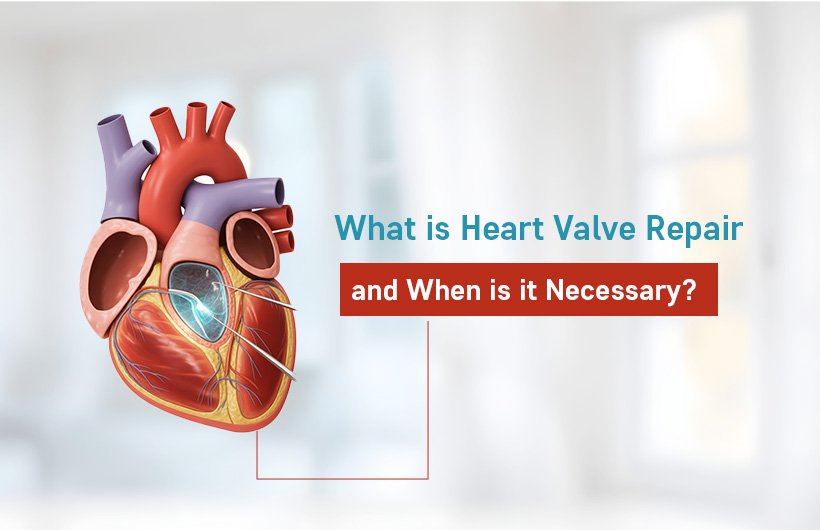Heart valves are the small but powerful structures that keep your blood flowing in the right direction. Each time your heart beats, these valves open and close, ensuring blood moves forward and doesn’t leak backwards. Damaged or diseased valves make pumping difficult, and your heart does not pump effectively. That is where heart valve repair comes into the picture.
In a large number of patients, this operation can restore normal heart functioning, alleviate symptoms and vastly enhance quality of life. When you are seeking valve repair surgery in Ahmedabad or heart valve treatment, it is vital to know what valve repair entails and when it should be done before meeting experts such as Dr. Jignesh Patel, a cardiologist in Ahmedabad.
Understanding Heart Valve Problems
There are four valves in your heart.
- The mitral valve
- Aortic valve
- Tricuspid valve
- Pulmonary valve
These are the two problems that arise when any of these valves fail to open or close:
1. Stenosis: the valve becomes too tight, and this limits blood flow.
2. Regurgitation (or insufficiency): the valve fails, and blood flows against the direction that it should be flowing.
In time, valve disease, without treatment, can weaken the heart to such a point that it may fail, cause arrhythmias, a stroke or trigger sudden cardiac arrest.
What is Heart Valve Repair?
Heart valve repair is a surgical procedure designed to fix damaged valves instead of replacing them. The goal is to restore normal valve function while preserving as much of your natural heart tissue as possible.
Common repair techniques include:
- Annuloplasty: strengthening or tensing the valve by wrapping the ring made of an artificial substance around the annulus.
- Leaflet repair: shaping or cutting valve leaflets to allow them to close or seal correctly.
- Chordae tendineae repair: a replacement or shortening of the strings keeping the valve leaflets.
- Balloon valvuloplasty: the valvuloplasty is widened with the assistance of a catheter balloon.
Repair over replacement is preferred whenever possible since it reduces the long-term risks and can usually avoid necessitating lifelong blood thinners.
What Is the Use of Heart Valve Repair?
All Heart valve repair issues do not require an operation. The early stages of the disease can be dealt with using drugs and lifestyle adjustments in some patients. Surgery is, however, necessitated by:
- Symptoms impair the usual life: difficulty in breathing, feeling weary, chest pain, collapsing, or swelling of legs/ankles.
- Diagnostic tests diagnose: There is diagnostic confirmation of severity: Echocardiogram demonstrates severe stenosis or regurgitation.
- Heart performance: Under untreated conditions, the heart will weaken or enlarge. The disease progresses quickly: Although this disease does not have critical symptoms, in some cases, the doctor can prescribe surgery to avoid irreversible consequences.
- Infection: Endocarditis is an infection of the heart valves, which at times necessitates immediate repair.
- Briefly: when damage to the valves is significant and poses a threat to the long-term functioning of your heart, your physician will advise repair earlier rather than later.
Heart valve surgery types
1. Open Valve Repair
- Conventional method that requires a cut in the chest.
- The repair of the valve occurs with the heart stopped momentarily.
- The gold standard in complicated valve issues remains to be.
2. Minimally invasive surgery
- Lesser cuts, minimal pain and quick recuperation.
- Can include robotic-assisted surgery.
- They are prevalent in the repair of the mitral valve.
3. Catheter-Based Procedures
- Transcatheter Aortic Valve Replacement (TAVR) – treated in case of aortic valve disease.
- MitraClip procedure- mitral regurgitation, high-risk patients.
- Performed using blood vessels, and it does not require major cuts.
Benefits of Heart Valve Repair
Choosing repair over replacement (when possible) has distinct advantages:
- Preserves natural tissue for better long-term function.
- Lower surgical risk compared to full valve replacement.
- Fewer complications like stroke or infection.
- No lifelong anticoagulants in most cases.
- Improved survival and quality of life.
Risks and Considerations
Like any surgery, valve repair comes with risks. Possible complications include:
- Bleeding/infection
- Stroke or Blood clots
- Irregular heartbeats (arrhythmia)
- Failure of the valve, which forced the introduction of a re-operation
Nevertheless, the risks can be reduced as long as one has an experienced Heart specialist near you, close to where he/she stay.
Recovery following Heart Valve Repair
Recovery is based on the nature of surgery:
1. Hospitalization:
- 5-7 days of open-heart surgery.
- 2-3 days after a minimally invasive or catheter procedure.
2. At Home:
- Not to lift heavy objects during 6-8 weeks.
- Recovery is accelerated by the cardiac rehab programs.
- Follow-ups and echo tests to follow up.
The majority of patients can resume normal activities after 2-3 months, and improvement in energy and breathing is dramatic in most patients.
When do you want to see a Cardiologist?
Be keen on warning signs. Book an appointment with a cardiologist in Ahmedabad in case of symptoms like:
- Difficulty with the movement of the air in their normal activities
- Pain in the chest or palpitation
- Feelings of dizziness and fainting
- Ankles, feet or abdominal swelling
When it is diagnosed at an early stage, it becomes easier than when damage has already been done to the heart.
Why Choose Dr. Jignesh Patel in Ahmedabad?
When you need the most competent heart valve surgery in Ahmedabad, then you must consider Dr. Jignesh Patel.
What distinguishes him is
- Experience with all valve procedures: open-heart as well as catheter-based.
- Individualized care: discusses treatment options in lay language.
- Patient-first philosophy: it is priority-oriented toward long-term patient safety and effectiveness.
- Easy accessibility: situated in Ahmedabad, so the specialised treatment is near at home.
Your heart doesn’t wait—and neither should you. If you or a loved one has been diagnosed with valve disease, consult Dr. Jignesh Patel, cardiologist in Ahmedabad, for advanced heart valve treatment. Schedule your appointment today and take the first step toward a healthier heart.






